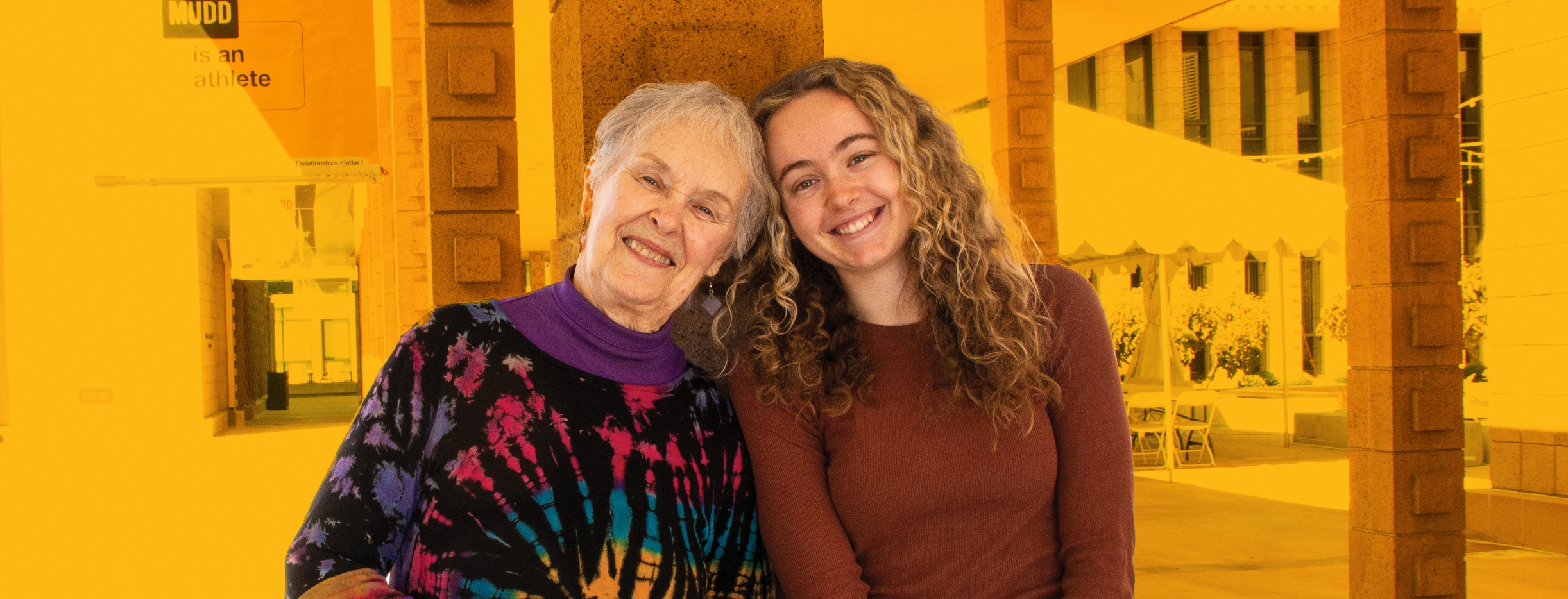See you in class, Grandma
An intergenerational course brings family members together
Last spring, engineering major Mikayla Mann ’25 and her grandmother, Claremont resident Penelope Mann, took Feminism and Science taught by Pomona College professor Sue Castagnetto and is part of the Napier Initiative. This partnership between Pilgrim Place Retirement Community and the 5Cs offers intergenerational courses centered on social justice. Five elders participated in the class along with 15 students from the 5Cs.
Whose idea was it to take the class together?
Penelope: I was interested in taking a Napier class, and then saw the topic and thought, gosh, you know, there’s Mikayla, right there at HMC. Let me just ask her if she’d be interested. I’m not a scientist, I’m a retired minister, but I was part of that wave of feminism in the late ’60s and ’70s. We were advocates for exactly what Mikayla’s benefiting from now. It was a chance to see my own granddaughter benefiting from the efforts I was part of. And then, you know, it was a chance to hang out with Mikayla more often!
Mikayla: When she asked me, I thought, how many people get to say they take a college class with their grandma? It sounded like a great opportunity. Also, I was really intrigued by the title, Feminism and Science because, well, I am a woman in science! It’s a philosophy class, and it’s my first foray into the social justice side of women in STEM. The class focuses a lot on discrimination against women in the STEM workplace, historically and in the present. I saw how I could apply that to my own life.
What was it like to be in class together?
M: It was definitely a unique class experience, because there was obviously a gap in the experiences of the elders versus the college students. Hearing the elders talk about the wave of feminism they experienced in earlier decades was really interesting. Also, I look to my grandmother as someone whose perspective on the world I want to emulate as I move through life. So, I really liked hearing her thoughts, especially on the more difficult issues that we considered.
P: We often sat beside each other in class. So when there were small group discussions, we’d be in the same group. It was just nice to hear how Mikayla thinks about things. It’s encouraging to see young women in science being able to articulate positions, but not intimidate someone else and not be intimidated when challenged.
What class topics were especially interesting?
P: We looked at how women have been kept out of the sciences historically and are still kept out today in a number of ways. I’m not surprised that women’s research wasn’t valued in the past, but we saw that there’s still a lot of instances where women aren’t taken seriously as researchers.
M: And we looked at the stereotypes as to why women are still cut out of science, such as women are more emotional or less analytical. It amazes me that even I have those implicit biases in my subconscious sometimes, even though I’m a woman in science and both my parents are in engineering (Joshua ’94, P25 and Michelle Mann ’93/94, P25).
P: Another thing we discussed was, if there were more women in science, would they ask different questions and do different research? In some articles we read, we discovered that when women are involved on teams, there is more collaboration, more listening and ideas brought in, which are all qualities of the best functioning teams. And in teams with more women, more questions are raised about how the science will affect society.
M: In class, we called those techniques of practicing science that you just described “feminist science.” I see it a lot at Harvey Mudd—in the mission statement about impact on society and in our general practice of collaboration, asking larger questions and viewing the world from a broader point of view. It’s what we call a holistic perspective as opposed to reductionist—looking at how all the parts work together.
Did you do homework together?
M: She didn’t have to write the essays! (laughs)
P: Those are the usual guidelines for the elders taking Napier classes (laughs). We don’t have to take the exams or do the essays, but we have to do all the reading and preparation to participate in class.
M: But we debriefed about the class a lot. And now we have more things to discuss together. It definitely brought us closer.
